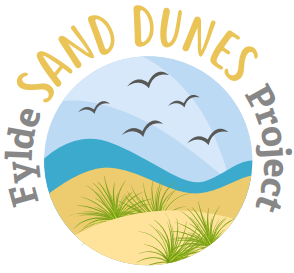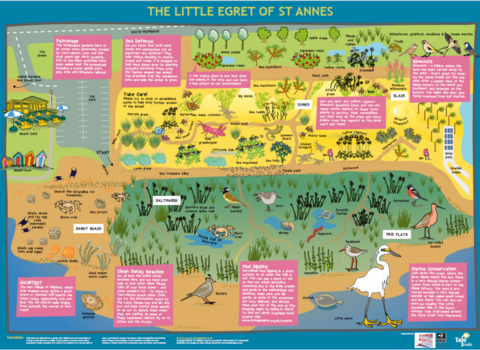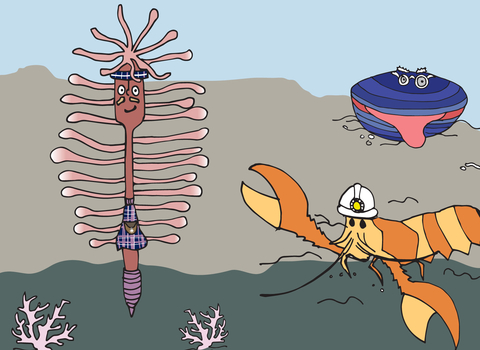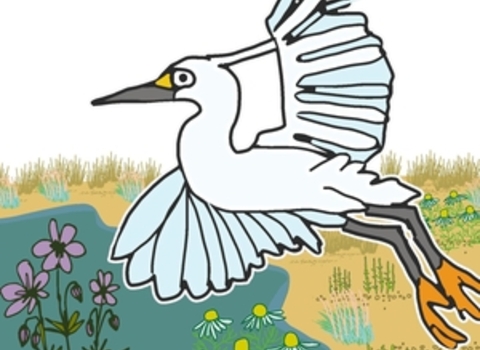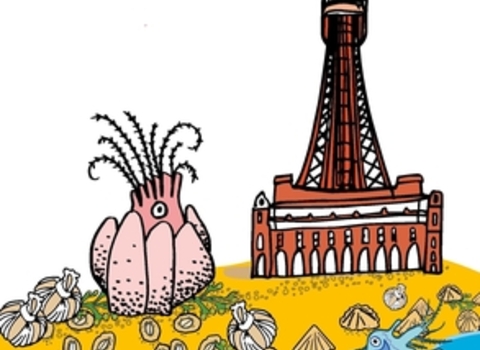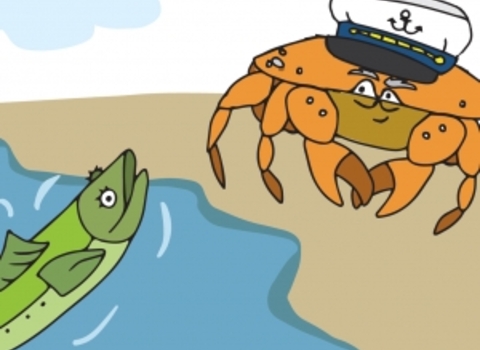Fylde Sand Dunes Project
Over the past 150 years, more than 80% of the sand dunes in Lancashire have been lost
The Fylde Sand Dunes Project is a partnership between The Wildlife Trust for Lancashire, Manchester and North Merseyside, Fylde Council and Blackpool Council, currently exclusively funded by The Environment Agency until 2027. This project works hard to encourage visitors to the dunes in a way which does not further threaten their existence, whilst letting people know all about the amazing wildlife that lives in this special place.
We are also working to improve the dunes as a sea defence feature; increasing their width by encouraging natural dune growth on the foreshore. The dunes act as a natural barrier to the sea at high tide, and release sand during storm conditions to reduce wave action.
With the help of volunteers and the local community, the Dunes Project aims to make the dunes a better place for both wildlife and people.
Aims
The main aims for management of the Fylde sand dunes are to:
- Enhance the nature conservation interest of the coastal habitats
- Improve the efficiency of the dunes and saltmarsh as soft sea-defence
- Enhance public appreciation and enjoyment of the dunes

Project partners & funding
Based on the Fylde coast, the Fylde Sand Dunes Project is a partnership between Fylde Council, Blackpool Council and The Wildlife Trust for Lancashire, Manchester and North Merseyside. The project is currently exclusively funded by The Environment Agency until 2027.

Habitats and wildife
The range of conditions in a sand dune habitat supports a surprisingly rich variety of plants and wildlife that are well adapted to their environment.
There are over 280 vascular plant species recorded on the Fylde sand dunes, including several internationally rare plants which are endemic to sand dunes in the UK, including the interestingly named Isle of Man cabbage.
Insects are numerous and varied in the dunes, with over 150 species of butterflies and moths recorded. The Fylde dunes are also home to breeding birds including stonechats, skylarks and reed buntings.

Flood defence
The dunes are not only important for wildlife and recreation, they are also crucial for their flood defence properties. The dunes act as a natural barrier to the sea at high tide, and release sand during storm conditions to reduce wave action. The aims of the Fylde Sand Dunes Project feed in to the Environment Agency's Shoreline Management Plan (SMP2); a non-statutory, high level policy document for coastal flooding and erosion risk management planning.
Practical conservation
The project carries out regular practical conservation methods on the dunes which includes:
- Controlling invasive non-native species (INNS)
- Repairing the dunes by thatching and filling blow-outs (weak spots in the dunes)
- Developing pathways to create recognisable access points and reduce damaging dune erosion
- Creating dune slacks to encourage a greater diversity of wildlife
- Erecting posts, chestnut paling fencing, and burying recycled Christmas trees on the foreshore to trap wind-blown sand and create new embryo dunes.
- Planting dune grasses to anchor sand particles so sand is not blown away from the dune system
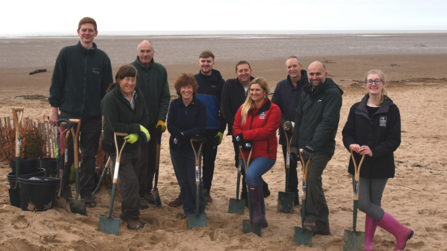
Christmas tree planting
Each new year, we recycle old Christmas trees to provide improved coastal defence against sand and sea for residents of Lytham, St Anne’s and Blackpool. The Christmas trees play a vital role as the branches and pines from the trees stick out of the beach towards the prevailing wind direction and trap sand particles as they drift ashore, helping sand to accumulate and eventually build new embryo dunes.
The trees are donated to various drop off points along the Fylde coast and are then used to create sand dunes on the foreshore of the local beaches. The annual Christmas tree planting event occurs every year, and is usually a three-day event taking place at the beginning of February. Look out for the event in our events section.
Find out about our 2026 Christmas Tree Planting Details here🔗
Christmas tree planting with the Fylde Sand Dunes Project ©Jack Bradshaw
Community engagement and education
We want to encourage both visitors and residents to feel a sense of ownership of their local coastline. The project offers an outreach programme delivering public engagement and education in the form of:
For more information about our outreach programme please get in touch via email.
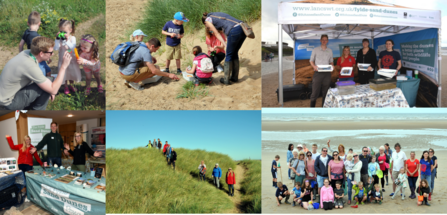
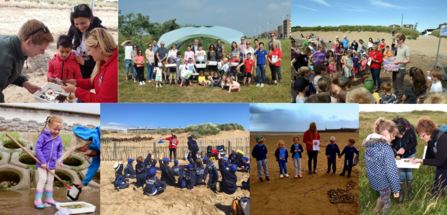
Sand lizard reintroduction
Between 2017-2021 the Project has been part of an exciting initiative to reintroduce sand lizards back on to the Fylde Sand Dunes. Sand lizards are one of the UK's rarest reptiles, unfortunately confined to just few sites as destruction of their habitat has massively reduced their range, so reintroduction programmes (like this one) have helped to establish new populations.
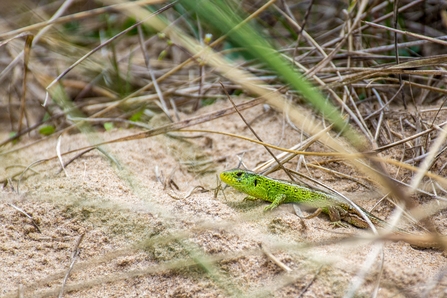
Sand lizard ©Andrew Hampson
How many sand lizards have we released?
Since 2018 we have released a total of 412 captive-bred sand lizard hatchlings on to the dunes.
How do we monitor them?
Our Team have a special licence to be able to survey for the lizards. We conduct walk-over presence/absence surveys on warm quiet mornings between April-September when the lizards are usually out basking on the south-facing slopes. It is really positive for the reintroduction that we have already seen egg shells, wild hatchlings and juveniles, showing that the population is becoming established. We will continue to monitor their success over the coming years.
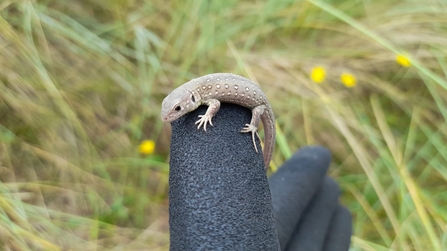
How to identify a sand lizard
Female sand lizards are a sandy-brown colour, with rows of dark blotches along the back; males have green flanks that are at their brightest during the breeding season, making them easier to spot.
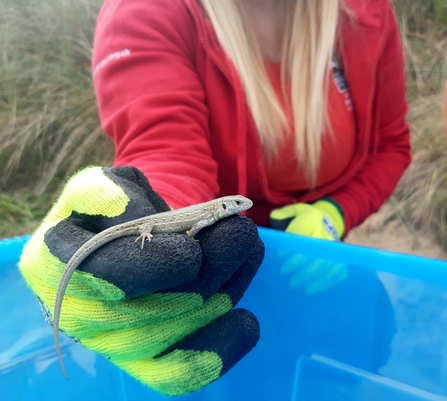
Beach school
Beach School is a new, unique outdoor learning experience offered to local schools that aims to improve student's knowledge about their local coastal environment by connecting children and young people with nature.
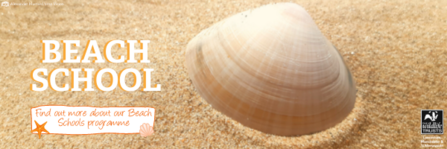
What is 'Beach School'?
Following the same ethos as Forest School, our Beach School project aims to use the coast as a platform for a whole new learning experience, in order to provide children with the opportunity to explore their natural surroundings in an organised setting.
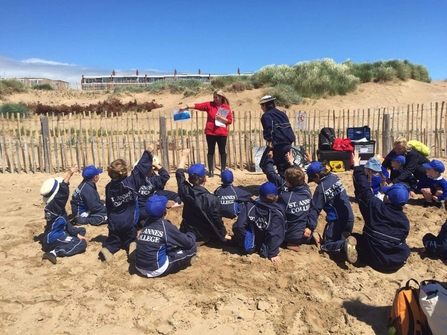
Our Beach School vision
Historically, beaches have always attracted a large variety of people for a number of different reasons. Unsurprisingly, people that have easy access to their local coastline often visit on a regular basis, but what about those who cannot easily access a beach or coastal environment? We believe that every child should experience the wonders of our beautiful British coastlines. Therefore, we aim to remove this barrier and provide children with the opportunity to visit, learn and fall in love with the beach. By providing a hands-on inspirational learning environment, we are already seeing the positive effects which outdoor learning has on children.
We believe that if a child has not had the opportunity to play and learn at the beach, they will not grow up feeling a connection to their local coastline. If the next generation is disconnected from the coast, they will not feel passionately enough to want to conserve and protect it in the future.
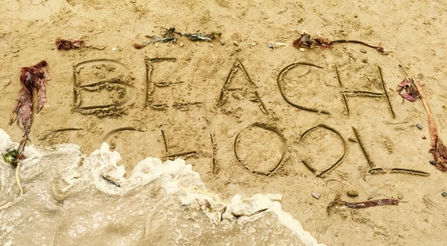
What does Beach School involve?
Through a variety of games and activities, Beach School sessions aim to educate children about their local coastal environment and how they can help to sustain it for future generations.
The topics explored during beach school sessions may include:
- How to behave sensibly and act responsibly when using the beach
- Exploring the natural coastal environment (beach combing/strandline searching, rockpooling, mud dipping, exploring the sand dunes etc.)
- Seasons and tides
- Pressures on the marine environment (pollution, marine plastics, climate change, overfishing, development at sea etc.)
- Marine protected areas
- Species identification and information
- Coastal habitats
- Understanding sea defences – hard/soft defences
- How marine flora and fauna are adapted to survive in their environment
- Practical conservation on the sand dunes (planting dune grasses, digging dune slacks to increase biodiversity etc. - Can be used towards DoE or John Muir)
- Mini beach cleans/litter picks
- Environmental art
- Survival skills: including navigation, building shelters, fire lighting and outdoor cooking
Within these activities children will also develop primary skills such as team working, basic instincts, confidence in an outdoor setting, emotional intelligence, social skills, and health and safety initiatives.
We recognise the vital importance of promoting an understanding of the natural world and believe our Beach School programme is an ideal platform for delivery.

Social media
Stay up-to-date with all our Project conservation work, events, and so much more by following us on our social media channels:
Project videos
Fylde Sand Dunes Project Information Video (https://www.youtube.com/watch?v=TNBNKN62lOs)
Fylde Sand Dunes Project Information Video
Christmas tree planting on the Fylde Sand Dunes (https://www.youtube.com/watch?v=g-dDIWodtOY)
Christmas tree planting on the Fylde Sand Dunes
Guided walks on the Fylde Sand Dunes (https://www.youtube.com/watch?v=2MsExIV_J4A&t=4s)
Guided walks on the Fylde Sand Dunes
Discover the wild wonders of the Lancashire coast (https://www.youtube.com/watch?v=yeQMx-iW1fs&t=5s)
Discover the wild wonders of the Lancashire coast
Guided walks
We offer FREE regular guided walks on the sand dunes. The walks occur on the first Sunday of every month (except January) and start at 10am from North Beach in St Anne's. The guided walks aim to promote the importance of our amazing dunes and to provide information about the project and our local wildlife.
Find out more about our sand dune guided walks including how to book in our events section:
Guided walks on the Fylde Sand Dunes (https://www.youtube.com/watch?v=2MsExIV_J4A&t=4s)
Guided walks on the Fylde Sand Dunes
There's all these things living so close to my home that I didn't know were there! The people who run it are so knowledgeable, they've got fantastic volunteers working alongside Lancashire Wildlife Trust & Fylde Council to answer all your questions - It's a great morning!
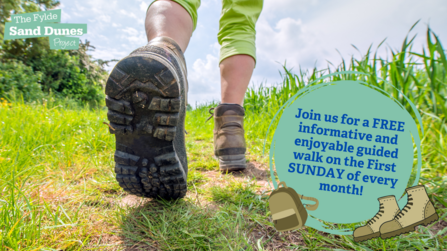
Get involved
The Project really wouldn't be what it is today without the help of our wonderful, hard-working and dedicated volunteers.
Our volunteers help with practical conservation, surveys, events, lead guided walks and many more!
If you'd like to get involved by volunteering with the Fylde Sand Dunes Project, please sign up to be a Lancashire Wildlife Trust volunteer using the link below:
Fylde Sand Dunes Project Information Video (https://www.youtube.com/watch?v=TNBNKN62lOs)
Fylde Sand Dunes Project Information Video
"I feel really good after a day of practical work on the dunes. It's rather therapeutic, and I've learnt a lot about dune processes, vegetation and wildlife whilst volunteering with this project”
How sand dunes are fighting climate change
The Fylde Sand Dunes are more than just piles of sand. They're living ecosystems protecting our coastline while providing habitat for rare species found nowhere else on earth. Watch our podcast episode to find out more.
Find out more
Read our blogs
Leaflets & reading materials
Contact us
For information about the Fylde Sand Dunes Project please contact Amy, our Project Officer:
For information about volunteering with this Project, please visit our volunteering page, fill out the online volunteering form, or contact our volunteer co-ordinator:
Find out more about volunteering
Contact our volunteer co-ordinator
Other contact options:
Social media:
